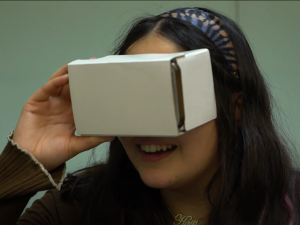Tar Heels Build Language Confidence with Virtual Reality
February 20, 2023University Communications

Tar Heels in Caroline Sibley’s Advanced Arabic class use virtual reality to explore a virtual world with students in Morocco and Algeria in real-time to hone their language skills.
Virtual reality headsets are most closely connected to computer science, but they are a key ingredient in Teaching Assistant Professor Caroline Sibley’s Advanced Arabic class.
Though they were physically half a world apart, Tar Heels in Sibley’s class used Google Cardboard VR devices to explore a virtual world with students in Morocco and Algeria in real-time. The students navigated the virtual environments together over the course of the fall semester to complete assignments and hone their language skills.
“We’ve been in a classroom, and we’ve been in a historical site with ruins,” said Hasti Sadri, a junior peace, war and defense major. “I will explain what I understand in Arabic, and then [my partner from Algeria] will go in, and she will explain what she understood in Arabic and what I missed and what I can work on. And then we do the same in English for the English clues.”
The experience is funded by the Stevens Initiative and the U.S. Department of State to create virtual exchanges between American university students and their counterparts in the Middle East and North Africa. Sibley said the Tabadul Program has been invaluable in building her students’ confidence in speaking Arabic and developing their understanding of the region’s culture.
“Doing the VR really helps to spur conversations about different things,” said Joe Wujek, a junior history major and student in the Advanced Arabic class. “It’s so important in an increasingly diverse country that we live in to have a knowledge of a different language no matter what that language is because people come from all over the world.”
Sibley’s course in the College of Arts and Sciences’ Asian and Middle Eastern studies department is one of many ways Carolina is preparing Tar Heels to be global leaders through the University’s Global Guarantee.
The Global Guarantee ensures that a variety of opportunities are available, such as study abroad, language and area studies, Collaborative Online International Learning (COIL) courses, virtual global research and internships, on-campus global programs and events and globally oriented courses.
“At Carolina, faculty members like Caroline Sibley are diversifying and strengthening global learning in innovative ways, which helps us create a rich menu of global education opportunities for students through the Global Guarantee,” said Sharmila Udyavar, associate director of global education in the Office of the Vice Provost for Global Affairs, who oversees Carolina’s COIL program, which involves virtual teaching and learning between faculty and students in two or more countries.
This story was originally published by University Communications.
